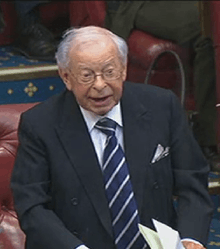Joel Barnett
Joel Barnett, Baron Barnett, PC (14 October 1923 – 1 November 2014) was a Labour Party politician. As Chief Secretary to the Treasury in the late 1970s, he devised the Barnett Formula that allocates public spending in Scotland, Wales and Northern Ireland.[1]
The Lord Barnett | |
|---|---|
 Barnett's last appearance at House of Lords questions. | |
| Chair of the Public Accounts Committee | |
| In office July 1979 – 9 June 1983 | |
| Preceded by | Edward du Cann |
| Succeeded by | Robert Sheldon |
| Shadow Chief Secretary to the Treasury | |
| In office 4 May 1979 – 14 July 1979 | |
| Leader | James Callaghan |
| Chief Secretary to the Treasury | |
| In office 5 March 1974 – 4 May 1979 | |
| Prime Minister | Harold Wilson James Callaghan |
| Preceded by | Tom Boardman |
| Succeeded by | John Biffen |
| Member of Parliament for Heywood and Royton | |
| In office 15 October 1964 – 9 June 1983 | |
| Preceded by | Tony Leavey |
| Succeeded by | Constituency Abolished |
| Personal details | |
| Born | 14 October 1923 Manchester, England |
| Died | 1 November 2014 (aged 91) Manchester, England |
| Political party | Labour |
Career
Barnett was born in Manchester, the son of a tailor, and was educated at Manchester Central High School.[2] He worked as an accountant. He was elected a councillor on Prestwich Borough Council 1956-1959 and was treasurer of Manchester Fabian Society.[2] Barnett stood in Runcorn in 1959 without success. He was elected Member of Parliament for Heywood and Royton in 1964. He was a member of the Public Accounts Committee from January 1966.
Barnett served as Chief Secretary to the Treasury from 1974 to 1979, gaining a seat in the cabinet from 1977 onwards, and was Denis Healey's right-hand man in the Callaghan Government. During this time he oversaw the devising of what is known as the Barnett Formula by which public spending is apportioned between England, Scotland, Wales, and Northern Ireland. He subsequently joked about the strange and unexpected form of immortality that was accorded to him by "having his own formula". Following the Scotland Act 1998 and devolution, he argued that the Formula was unfair to England and should be abandoned or revised.[3] He reiterated this view in 2014 shortly before the Scottish independence referendum, calling the Formula unsustainable and saying it had become an embarrassment.[4]
Barnett held the Chairmanship of the Public Accounts Committee from 1979–83. He published a memoir Inside the Treasury in 1982, describing his experience as chief secretary.[5] Barnett's Commons seat having been abolished by boundary changes, he was created a life peer as Baron Barnett, of Heywood and Royton in Greater Manchester on 30 September 1983.[6] He served on select committees in the House of Lords including the European Union Committee, the Economic Affairs Committee and the Monetary Policy Committee of the Bank of England.[1] He was appointed vice-chairman of the Board of Governors of the BBC by Conservative Prime Minister Margaret Thatcher in 1986 and held the post until 1993.[5] He died on 1 November 2014, aged 91.[1]
References
- Lord Barnett, creator of formula for UK spending allocations, dies, BBC News, 3 November 2014
- "Lord Barnett - obituary", The Telegraph, 3 November 2014
- Call for funding shake-up, BBC News, 22 June 2000
- My funding formula for Scotland is a 'terrible mistake', Lord Barnett admits, The Telegraph, 16 September 2014
- Lord Barnett obituary, The Guardian, 3 November 2014
- "No. 49499". The London Gazette. 5 October 1983. p. 13005.
External links
| Wikiquote has quotations related to: Joel Barnett |
- Hansard 1803–2005: contributions in Parliament by Joel Barnett
- Leigh Rayment's Historical List of MPs
| Parliament of the United Kingdom | ||
|---|---|---|
| Preceded by Tony Leavey |
Member of Parliament for Heywood and Royton 1964–1983 |
Constituency abolished |
| Political offices | ||
| Preceded by Tom Boardman |
Chief Secretary to the Treasury 1974–1979 |
Succeeded by John Biffen |
.svg.png)